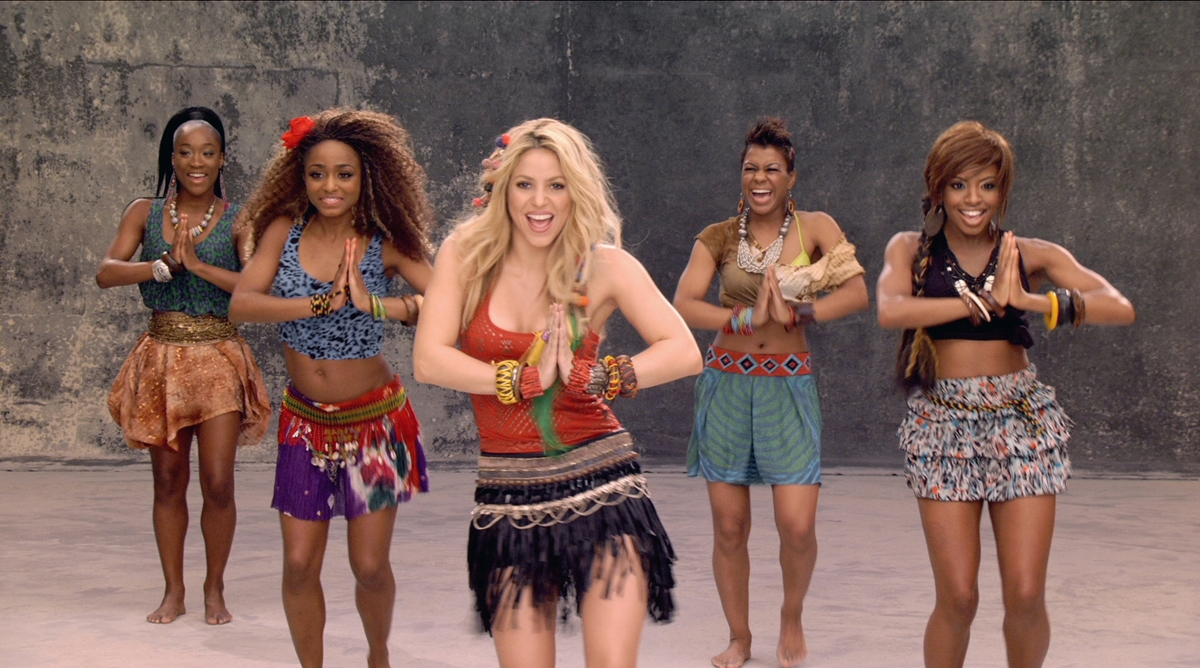The media’s goal was to make it sound as if Waka Waka was for Africa, and Shakira definitely made an effort to drive that point across. If you look at some of the lyrics below
Tsamina mina, eh eh
Waka waka, eh eh
Tsamina mina zangalewa
This time for Africa
It seems as if everything would be centered around Africa, but that was not the case.
The song stirred a lot of controversies when South Africans complained that a native was supposed to provide an anthem.
But in calls to local talk shows, interviews with the press, and meetings with FIFA officials, South Africans demanded to know why an African wasn’t chosen for the high-profile role. The South African artist’s union proclaimed that the concert was “not an African event” and had called for a boycott.
PBS
FIFA eventually expanded the number of African acts, with the final roster now including the Soweto Gospel Choir, trumpeter Hugh Masekela and Somali hip-hop star K’naan.
African artists were added after the threat of a boycott.
Was it a cold business decision based on understandable marketing/business fundamentals? Or was it an example of discrimination on a global scale?
Would it have made business sense for an African to headline the official song? The answer to the question is the thrust of the analysis.
The Small Issue of Language
How much recognition a song gets largely depends on how many listeners and viewers it can get.
Waka Waka for Africa by Shakira is sang in English, Spanish & Fang. Fang was the only language native to Africa.
If you consider the English and Spanish used in Waka Waka, the languages are spoken by a combined 1.8 billion worldwide.
South Africa’s native language isiZulu, is only spoken by about 16 million people. One can argue that this is a basis for not having a South African native sing the anthem.
How about other African countries? Do we not speak a language that has a big enough following worldwide?
Swahili is said to have between 100 and 150 million speakers. This is the official language of Tanzania, Uganda, the Democratic Republic of Congo and Kenya, but it is also used in countries like Ethiopia, Sudan, Burundi, Rwanda, southern Somalia, northern Mozambique and the Comoros Islands.
Spoken by 280 million people worldwide, Arabic is also used by people in countries like Egypt, Algeria, Morocco, Mauritania, Libya, Tunisia and Eritrea.
Portuguese is spoken in 6 states including Angola, Mozambique, Guinea-Bissau, Cape Verde, Sao Tome e Principe and Equatorial Guinea. Portuguese is used by 270 million people worldwide.
26 African states speak French including Gabon, Mauritius, Cote d’Ivoire, Senegal and Sao Tome e Principe and others. Overall, French is spoken by over 267 million people worldwide.
How Previous World Cup Songs Fared in Terms of Language
Let’s take a look at the songs before Waka Waka in terms of their global reach when it comes to language.
| World Cup | Song | Language | Global Population Speaking the Language |
| 1962 | El Rock Del Mundial | Spanish | 450 million |
| 1966 | World Cup Willie | English | 1.35 billion |
| 1970 | Futbol Mexico 70 | Spanish | 450 million |
| 1974 | Futbol | Polish; English; German; Russian; and Spanish | 2.23 billion |
| 1978 | El Mundial | None | – |
| 1982 | Mundial 82′ | Spanish | 450 million |
| 1986 | El mundo unido por un balon | Spanish | 450 million |
| 1990 | Un’estate italiana | Italian; English | 1.368 billion |
| 1994 | Gloryland | English | 1.35 billion |
| 1998 | La Copa de la Vida | French; Spanish; English | 2.067 billion |
| 2002 | Let’s Get Together Now | Japanese; Korean | 208 million |
Swahili comes close in terms of reach at 150 million speakers. Arabic, at 280 million, beats the language reach of World Cup 2002. Portuguese beats the World Cup 2002 at 270 million speakers. French speakers worldwide are 267 million, which is more than was at World Cup 2002.
The numbers above show that the global reach of language is not what stopped an African native from headlining the 2010 World Cup event.
Analysis of World Cup Songs by Genre
What genre do you think Waka Waka for Africa by Shakira falls into? FIFA probably considers genre in terms of the potential global appeal of a song.
The top ten music genres are:
Pop
Hip-hop
Dance & electronic
Latin music
Indie & Alternative rock
Classic music
K Pop
Country
Metal
In the last 15 or so World Cups the official songs have been of the following genres:
Pop – World Cup Willie; Futbol; El Mundo unido por un balon; La Copa de la Vida; Boom.
When it comes to hip-hop, we have We Are One and Live It Up
In the rock genre, the songs that have been featured are: El Rock del Mundial; Un’estate italiana; Gloryland
Classical music has the song The Time of Our Lives as its representative.
The song made for Africa by Shakira is in the Afro-Fusion or Soca genre. The only other song I know which has featured at the World Cup of the Soca genre is Hot Hot Hot by Arrow. Hot Hot Hot was not the official song though.
Other songs that made it to the World Cup that are not one of the top ten genres are Los Hermanos Zavala in the Comedy/Spoken Word genre. The other song is Mundial 82′, which is an Opera song.
In the case of Waka Waka, the genre is African, but it is not sung by an African. The end result is a song that does not really sound African. The official song not sounding African is in line with the analysis of genres made above.
Does Africa Have The Audience?
From a business standpoint, it makes sense to favour music that appeals to most of FIFA’s customers.
In the 2010 World Cup, the only African audience figures that were tracked were for South Africa and Egypt. 60% of the South African population watched the World Cup. 20% of the people in Egypt watched the event. Other territories fared as followed:
China – 25%
Brazil – 80%
Indonesia – 67%
Japan – 85%
USA – 30%
Mexico – 67%
Russia – 50%
UK – 78%
Italy – 80%
France – 70%
India – 5%
Spain – 88%
Korea Republic – 80%
Argentina – 85%
Australia – 28%
In World Cup 2014, Africa accounted for 10% of the total TV audience.
Come World Cup 2018 Africa’s representation did not go past 15%.
The business question to ask is, why have an African headline the concert when not many Africans are watching the tournament?
The Influence of Sony Music
In the early 2000s Sony became FIFA’s official anthem partner. Over the years Sony provided most of the anthems from its stable of artists.
Up until Sony terminated its contract with FIFA, only Sony Music artists feature on FIFA official anthems.
Below is a rundown of the record labels that have released FIFA World Cup anthems since Sony signed with FIFA:
| World Cup | Song | Record Label |
| 2018 | Live It Up | Sony Latin |
| 2014 | Ole Ola | RCA under Sony Music |
| 2010 | Waka Waka | EPIC under Sony Music |
| 2006 | The Time Of Our Lives | Song BMG |
| 2002 | Boom | EPIC under Sony Music |
If you are not a Sony Music artist, you have no chance. I am not sure how things shall develop since Sony terminated its contract with FIFA.
There are African artists that are under Sony. We have the likes of Ali Kiba; Davido; DBanj; Michael Keissou; Nneka and Tekno Miles. They are probably not considered to be big enough to headline a FIFA event.
Big stars such as Akon; Koffi Olomide; P Square; Salif Keita; Youssou N’Dour; Angelique Kidjo could have done Africa proud. Youssou and Angelique are Sony musicians by way of Columbia Records. All of these stars seem to have what it takes to headline the event. Maybe not from a business but a cultural standpoint. As you know, Africa does not provide a big enough audience for the World Cup.
Let’s take a look at how popular African stars are in comparison to musicians that Sony prefers.
The Influence/Marketability of a Musician
In the beginning, selecting a musician for the official song was based in social issues. A local musician got the honour, regardless of stature.
Since World Cup 2006, it has all been about stars, and how much money they can make for FIFA. In Waka Waka for Africa Shakira showed that it’s all business now. Let’s compare the influence of African musicians versus stars who have sung World Cup anthems before. The comparison is based on YouTube, a major outlet for music.
| World Cup | Musician | YouTube Subscribers | YouTube Views | Views Per Day |
| 2018 | Nicky Jam | 22.3 million | 14.3 billion | 4.1 million |
| 2014 | Pitbull | 14.8 million | 10.3 billion | 1.9 million |
| 2010 | Shakira | 33.2 million | 20.9 billion | 3.6 million |
| 2006 | Il Divo | 930 thousand | 507 million | 101 thousand |
| Koffi Olomide | 754 thousand | 290 million | 139 thousand | |
| P Square | 1.6 million | 915 million | 249 thousand | |
| Salif Keita | – | – | – | |
| Youssou N’Dour | – | 290 million | 76 thousand |
Il Divo was the last group of its size to get to sing at the World Cup. The table shows the change in strategy by FIFA to concentrate on big stars.
As you can see, the biggest African stars are about the size of Il Divo. It was thus inevitable that they would be snubbed by FIFA.
The fact that Shakira sang at an African event, was not a result of discrimination by FIFA. The decisions are based on business issues. Shakira offers a global reach that no African star can match. Africans themselves do not watch as much of the World Cup to justify complaining about the lead act. World Cup 2010 was not an African event, it was a global event. In Waka Waka for Africa, Shakira sent a meaningless message as far as Africans are concerned.




Leave A Comment